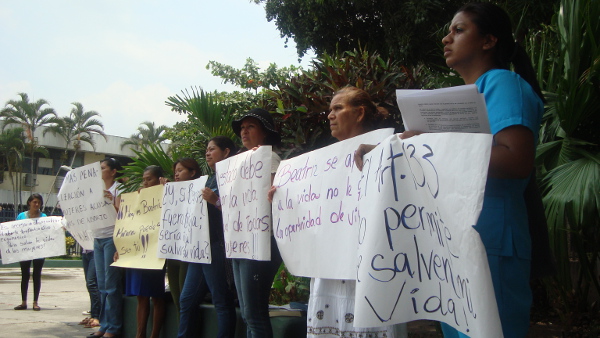The Battle to Save Beatriz's Life:
High Court in El Salvador Blocks Abortion
June 27, 2013 | Revolution Newspaper | revcom.us
The horror for women in countries where abortion has been criminalized in all circumstances has been forced into the light of day by the fight for the life of a woman in El Salvador, known only as "Beatriz." Her appeal to the country's Supreme Court to have a potentially life-saving abortion was denied on May 29. Beatriz suffers from lupus, a very serious, chronic immune disease, as well as kidney disease. Her illness was being aggravated by a five-month-old deformed fetus developing with only a brain stem and no brain, and virtually no chance of survival beyond a few days after birth.
As if mocking the humanity of this woman, the court's ruling stated that "the rights of the mother cannot be privileged over those" of the fetus.
A woman in El Salvador aborting a fetus faces eight years in jail; and some courts have added an additional 30 years by charging first-degree murder. Doctors performing abortions also face imprisonment. In a country of six million people, fewer than in Los Angeles County, 628 Salvadoran women have been imprisoned for abortion since 1998, when the total ban on abortion was made the law of the land. And nearly 60 pregnant women have died in El Salvador since 2012, many of whom could have been saved by therapeutic abortions, according to Salvadoran rights groups.
"A Form of Torture"
A battle raged for months in support of Beatriz by women's organizations and other groups within El Salvador, as well as internationally. Following the court's ruling protesters marched on the Supreme Court demanding a change in the ruling; and in the law. A woman representing a Salvadoran women's group fighting for changes in the abortion laws said; "This is a form of torture that she is going through." Beatriz's lawyer called the decision "misogynistic." He said, "Justice here does not respect the rights of women."
There was an international outcry as well, by women's organizations fighting against the criminalization of abortion; Amnesty International called the court's ruling "cruel and callous." The Inter-American Commission on Human Rights in April called for the government of El Salvador to protect the "integrity and health" of Beatriz.
Apparently seeing no other way out, Beatriz' medical team performed a premature cesarean section of the 27-week-old fetus on June 3. The baby had an incomplete skull and brain and died within hours. Following the operation Beatriz was in stable condition, in intensive care.
Since 1998, El Salvador has banned abortion under any circumstances, including to save the life of the woman. The Catholic Church, from the Vatican down, has played an aggressive role, and exerted powerful leverage on national policy in instituting this and similar laws throughout Latin America. In El Salvador in particular, the archbishop compared abortion to the Nazi genocide, and enthusiastically backed the total ban. And the church worked fiercely against the appeal by Beatriz and her medical staff for her right to an abortion.
In El Salvador and in most of the countries of Central America—and many other Latin American countries as well—the ban on abortion, under any conditions whatsoever, is now in place. Abortion was legalized in Mexico City in 2008, but since then over half of the states have passed initiatives banning abortion completely. It's been estimated that between 2003 and 2008, the annual number of abortions in Latin America was between 4.1 million and 4.4 million; and from 1995 to 2008, 95 percent of those abortions were considered to be unsafe.
The World Health Organization estimates that worldwide, 42 million abortions are performed each year; nearly half of them are illegal and unsafe. And unsafe abortions are the cause of about 47,000 deaths each year, or 13 percent of all pregnancy-related deaths. In West Africa abortion is responsible for one-third of maternal deaths. And in sub-Saharan Africa unsafe abortions account for as much as 50 percent of maternal deaths.
In the world today, the conditions women face are increasingly violent and degrading and horrific. And one cornerstone of that violence against women is in the way in which the criminalization of abortion is being institutionalized around the world.

Women in El Salvador demand the right to call for women to have life-saving medical treatment. April 2013.
Photo: Amnesty International
If you like this article, subscribe, donate to and sustain Revolution newspaper.
